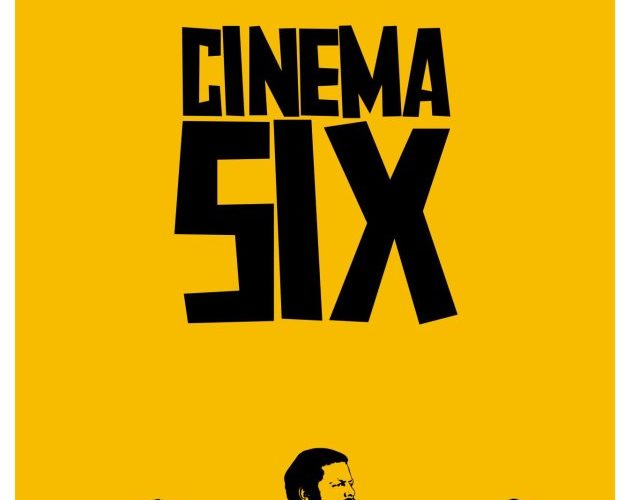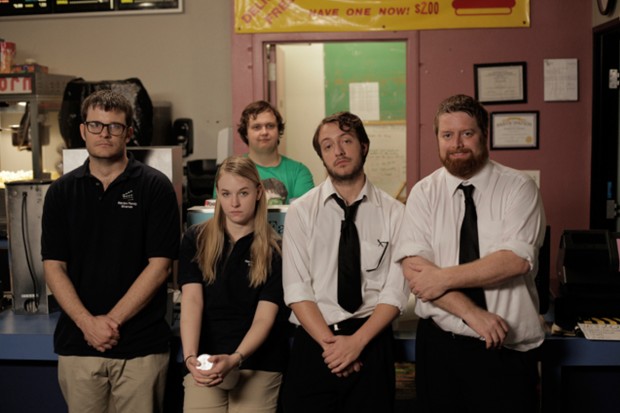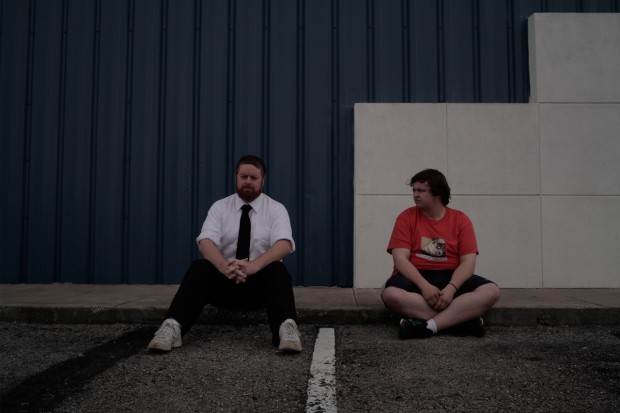There’s something about working at a movie theater that just sucks you in; although the pay is crappy and the customers are damn near unbearable, people can spend years of their lives shoveling popcorn, cleaning up vomit, and losing the best years of their lives. I should know, as I’ve been a theater employee for eight years. Cinema Six, from co-directors Mark Potts and Cole Selix, has a total grasp on the motivations of a movie theater employee: yes, it’s a crappy job, but it’s easy and it’s safe. To leave is to be forced to grow up and do something meaningful with your lives, to take that next step. By staying, you can put maturity off and avoid the harsh realities of adulthood. But while Cinema Six gets the mind of movie theater employees, as a movie, running at a mere 79 minutes, it comes off as an incomplete story filled with hit-or-miss raunchy humor.
Mason (John Merriman) has been an employee of Stanton Family Cinemas for what seems like forever, having risen up the ranks to become an associate manager. When his boss abruptly quits, he is offered the full-time manager position and while Mason sees this as good news, his wife Sarah (Heather Wallis) is not happy, fed up with her and their infant daughter playing second fiddle to his job. Meanwhile Mason’s best friend Dennis (Brand Rackey) has dropped out of college after his engagement is broken off due to infidelity on her part and he retreats back to the theater to lick his wounds and take his pain out on the customers. And then there’s Gabe (Potts), whose social anxiety and fear of failure give him second thoughts about attending college despite having been accepted. Six follows each character as they deal with their issues and fears in their own unique ways while also combating rude customers and their offbeat floor staff.
The set-up has potential for emotional resonance, but ultimately ends up falling flat more often than not. There are some truly funny moments in interactions with the customers (including one who goes off on the group every time they deny him the right to use his free pass) and in the verbal sparring between the three leads, but many of the jokes fall flat. The sense of humor is very raunchy, but it feels more like the forced kind where the joke is merely that the character said something obscene or swore. This is most present in the character of Cassie (Lindsey Newell), who exists merely to “act like a dude” and say/do ridiculous things. Through no real fault of her own, she attacks the material as best as she can, but Cassie’s screen time is met with more flinching than laughter. The other two women in Cinema Six, Sarah and Gabe’s crush Emaline (Madi Goff), don’t fare much better and certainly don’t come off as real women (especially a later scene that involves Emaline, a moment that torpedoes the momentum of her story/romance with Gabe).
By the time Cinema Six reaches its conclusion, it has taken some jarring turns and this leads to a few character arcs either feeling incomplete or unnaturally concluded through haphazard circumstances. Dennis is especially given the short straw in the development department, his breakup with his fiance never given the emotional heft that it deserved. The other staff members of Stanton Family Cinemas, already given very little screen time and almost nothing to do, don’t get an end to their story except for one exposition-heavy monologue.
Filled with wasted potential, outside of the three leads the characters aren’t given much of anything to do. The raunchiness of the humor feels like a crutch, and ultimately the story takes some bewildering turns that feel forced rather than natural. But despite its flaws, there are still some truly funny and clever moments scattered through out that anyone who has ever worked at a movie theater before will identify with. Cinema Six completely nails the allure of staying at a crappy movie theater job but unfortunately it ends up stumbling far more than succeeding.



